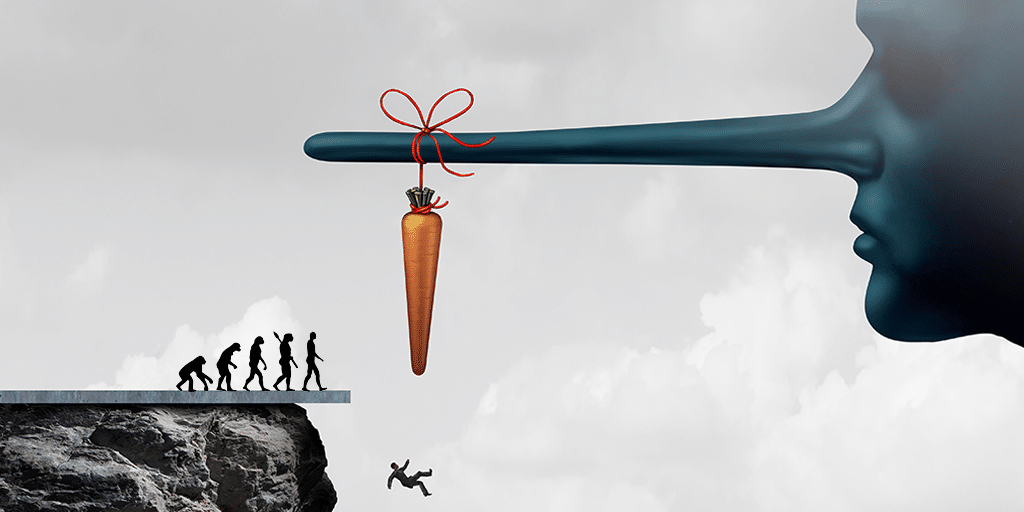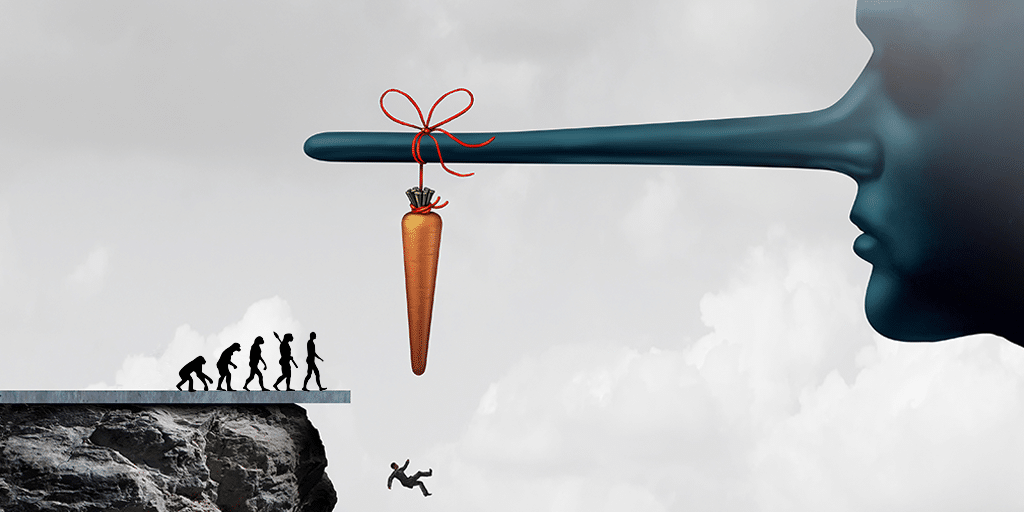The Evolution of Life, Probability Considerations and Common Sense-Part 7
| By: Dr. John Ankerberg and Dr. John Weldon; ©2002 |
| Modern science’s assigning the origin of the universe and all life in it to pure, random chance does an incalculable disservice to science because it “reduces scientific investigation not only to chaos but to sheer absurdity.” The authors suggest that modern science’s sin against reason is, in fact, a sin against God. |
Contents
The Evolution of Life, Probability Considerations and Common Sense – Part Seven
The Myth of Chance
A number of reputable scientists have stated their belief that evolution is a myth. In the following material we are going to briefly amplify this idea by concentrating on the myth of chance and what faith in chance does to science. In Not a Chance: The Myth of Chance in Modern Science & Cosmology, theologian and apologist R. C. Sproul points out that mythology was not only practiced by pre-modern cultures. It occurs in every culture and has even intruded significantly into the realm of science, e.g., in the spontaneous generation theory of evolution, that all life arose from dead matter solely by chance. He shows that the concept of chance—something happening totally without cause—is impossible. Again, the Macmillan Dictionary for Students (1984) defines impossible as, “not capable of coming into being or occurring”; “not possible” and “not acceptable as truth.”
And yet modern science argues that the universe and all life in it arose solely by chance. In the words of Nobelist Jacques Monod, “…chance alone is at the source of every innovation, of all creation in the biosphere. Pure chance, absolutely free but blind, [is] at the very root of the stupendous edifice of evolution….”[1]
Sproul argues persuasively that, for science and philosophy to continue in fruitful fashion, the modern penchant for chance must be abandoned once and for all. If not, the stakes are not insignificant—the very possibility of doing science lies in the balance. Essentially, when logic and empirical data are neglected or neutralized in the doing of science, then “mythology is free to run wild.”[2]
Modern science’s assigning the origin of the universe and all life in it to pure, random chance does an incalculable disservice to science because it:
- reduces scientific investigation not only to chaos but to sheer absurdity. Half of the scientific method is left impaled on the horns of chance. The classical scientific method consists of the marriage of induction and deduction, of the empirical and the rational. Attributing instrumental causal power to chance vitiates deduction and the rational. It is manifest irrationality, which is not only bad philosophy but horrible science as well. Perhaps the attributing of instrumental power to chance is the most serious error made in modern science and cosmology… if left unchallenged and uncorrected, [it] will lead science into nonsense…. Magic and logic are not compatible bedfellows. Once something is thought to come from nothing, something has to give. What gives is logic.[3]
Chance can explain nothing because chance itself is nothing: “chance has no power to do anything. It is cosmically, totally, consummately impotent…. It has no power because it has no being.”[4] One of the most inviolate and oldest laws of science is Ex nihilo nihil fit— “Out of nothing, nothing comes.” When scientists ascribe absolute power to nothing, they are creating myths. Here, chance is the “magic wand to make not only rabbits but entire universes appear out of nothing.”[5]
Consider again the Nobel-laureate and Harvard Professor Dr. George Wald when he stated concerning the evolution of life, “Given so much time, the ‘impossible’ becomes possible, the possible probable, and the probable virtually certain. One only has to wait: time itself performs the miracles.”[6]
Time is indeed the hero of the plot in the modern evolutionary storybook. Professor Abdus Salam, winner of the Nobel Prize for Physics, comments that one reason the Big Bang occurred ten billion years ago was that “it takes about that long for intelligent beings to evolve….”[7]
Sir John Eccles, winner of the Nobel Prize in Physiology/Medicine comments in a similar fashion, “You cannot make life out of hydrogen and helium, and that was the original stuff. You have to have the time for the creation of all the extraordinary elements that are necessary for living existence, and so you will have to have, shall we say, something like 10,000 million years from the Big Bang….”[8]
Again, time is not the hero and cannot perform miracles. To argue otherwise violates the laws of science, logic and common sense. Regardless, how did the universe exist forever and then do in time (i.e., create life) what it had not done forever?
More Magic
Sproul comments,
- Here is magic with a vengeance. Not only does the impossible become possible; it reaches the acme of certainty—with time serving as the Grand Master Magician.
- In a world where a miracle-working God is deemed an anachronism, an even greater miracle-worker replaces him: time or chance. I say these twin miracle workers are greater than God because they produce the same result with so much less, indeed infinitely less, to work with.
- God is conceived as a self-existent, eternal being who possesses inextricably the power of being. Such power is a sufficient cause for creation. Time and chance have no being, and consequently no power. Yet they are able to be so effective as to render God an anachronism. At least with God we have a potential miracle-worker. With chance we have nothing with which to work the miracle. Chance offers us a rabbit without a hat and—what’s even more astonishing—without a magician.[9]
A. E. Wilder-Smith, holding three earned doctorates in science, put it this way:
- Present-day biology has also discovered a magic wand which solves all biological and chemical problems with one wave of the wand. Does the origin of the most complicated machinery of a protein molecule need explanation? Do we need to explain how optical isomers are formed? Do we wish to know why the wings of certain butterflies are decorated with eagle’s eyes? The magic wand called chance and natural selection will without exception explain all of these miracles. It explains the origin of the most complicated biological machine—the enzymatic protein molecule. The explanation is fabulous—machines are formed of their own accord, spontaneously, just as the waving of a magic wand would demand. The same wand explains the billions of teleonomical electrical contacts in the brain. It explains the almost infinitely complicated wiring of the computer called the brain.[10]
Of course, as Wilder-Smith argues, it doesn’t explain anything. Further, to argue as modern science does that the universe “exploded into being” billions of years ago require the belief that the universe exploded from nonbeing into being. Since science has proven that matter cannot be eternal, this phrase must be taken literally. But to do so requires more faith in magic and is, in effect, a faith in self-creation, which, as Sproul shows, is something logically impossible. Thus:
- We can hardly resist the inference that that which exploded, since it was not yet in being, was nonbeing, or nothing. This we call self-creation by another name. This is so absurd that, upon reflection, it seems to be downright silly. It is so evidently contradictory and illogical that it must represent a straw-man argument. No sober scientist would really go so far as to suggest such a self-contradictory theory, would they? Unfortunately, they would and they do. This raises questions about the soberness of the scientists involved. But generally these are not silly people who make such silly statements. Far from it. They number some of the most well credentialed and erudite scholars in the world, who make a prophet out of Aristotle when he said that in the minds of the brightest men often reside the corner of a fool. In other words, brilliant people are capable of making the most foolish errors. That is understandable, given our frailties as mortals. What is not so understandable are the ardent attempts people make to justify such foolishness.[11]
Of course, there is much more going on here than poor science. In Romans 1:18-25 we are told that the unregenerate deliberately suppress the truth of God as Creator. Here the truth is suppressed by the rejection of the laws of science such as the law of causality, the law of noncontradiction and the law of biogenesis, that life arises only from life. That the rejection of scientific principles, laws and reasoning should be so forcefully employed in defense of what is inherently irrational and impossible (the creation of the universe from nothing), is surely a commentary on the condition of modern origins science.
A Sin Against God?
However, because God has created us as rational creatures, it may even be argued that modern science’s sin against reason is a sin against God. Scientists should know better. And, generally, in their rational moments they do. They know the universe didn’t arise from literally nothing. The suppression of truth is to try and make it seem as if it did. That is the sin. Most scientists, it seems, prefer to disguise their belief in magic by making the idea of chance origins appear scientific and rational. Why? Because often they do not personally like the consequences of having to seriously consider the implications of a personal creator God who will hold them accountable in this life. Given the odds against evolution and for creation, this is an unwise position at best. The conclusions of Solomon still stand:
- Let us hear the conclusion of the whole matter: Fear God, and keep his commandments: for this is the whole duty of man. For God shall bring every work into judgment with every secret thing, whether it be good, or whether it be evil. (Eccl. 12:13-14)
Notes
- ↑ Jacques Monod, Chance and Necessity: An Essay on The Natural Philosophy of Modern Biology (New York: Vintage, 1971), pp. 112-13, emphasis added.
- ↑ R. C. Sproul, Not a Chance: The Myth of Chance in Modern Science & Cosmology (Grand Rapids, MI: Baker, 1994), p. xiv; cf., R. J. Rushdoony, The Mythology of Modern Science.
- ↑ Ibid., pp. 10-11.
- ↑ Ibid., p. 6.
- ↑ Ibid., p. 9.
- ↑ George Wald, “The Origin of Life” in The Physics and Chemistry of Life, Ed., the editors of Scientific American (NY: Simon & Schuster, 1955), pp. 9, 12.
- ↑ Abdus Salam, “Science and Religion: Reflections on Transcendence and Secularization” in Henry Margenau and Roy Abraham Varghese (eds.), Cosmos, Bios, Theos: Scientists Reflect on Science, God, and the Origins of the Universe, Life, and Homo Sapiens (La Salle, IL: Open Court, 1994), p. 100.
- ↑ John Eccles, “A Divine Design: Some Questions on Origins” in Henry Margenau and Roy Abraham Varghese (eds.), Cosmos, Bios, Theos: Scientists Reflect on Science, God, and the Origins of the Universe, Life, and Homo Sapiens (La Salle, IL: Open Court, 1994), p. 161.
- ↑ Sproul, pp. 14-15.
- ↑ ”A. E. Wilder-Smith, The Natural Sciences Know Nothing of Evolution (San Diego, CA: Master Books, 1981), p. 26.
- ↑ Sproul, pp. 15-16.









[…] Read Part 7 […]